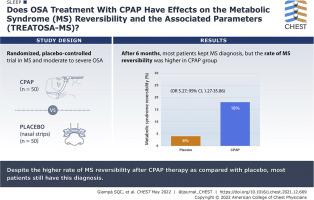Chest ( IF 9.6 ) Pub Date : 2022-01-19 , DOI: 10.1016/j.chest.2021.12.669 Sara Q C Giampá 1 , Sofia F Furlan 2 , Lunara S Freitas 2 , Thiago A Macedo 2 , Adriana Lebkuchen 3 , Karina H M Cardozo 3 , Valdemir M Carvalho 3 , Franco C Martins 4 , Indira F B Azam 5 , Valéria Costa-Hong 2 , Heno F Lopes 2 , Mariana L Baptista 6 , Carlos E Rochitte 6 , Luiz A Bortolotto 2 , Geraldo Lorenzi-Filho 4 , Luciano F Drager 7

|
Background
OSA is associated with metabolic syndrome (MS), but it is unclear whether OSA treatment with CPAP can revert MS.
Research Question
Does OSA treatment with CPAP per se have effects on the MS reversibility and the associated metabolic, adiposity and vascular parameters?
Study Design and Methods
The TREATOSA-MS trial is a randomized placebo-controlled trial that enrolled adult patients with a recent diagnosis of MS and moderate or severe OSA (apnea-hypopnea index [AHI], ≥ 15 events/h) to undergo therapeutic CPAP or nasal dilator strips (placebo group) for 6 months. Before and after each intervention, we measured anthropometric variables, BP, glucose, and lipid profile. To control potential-related mechanisms and consequences, we also measured adiposity biomarkers (leptin and adiponectin), body composition, food intake, physical activity, subcutaneous and abdominal fat (visceral and hepatic fat), and endothelial function.
Results
One hundred patients (79% men; mean age, 48 ± 9 years; BMI, 33 ± 4 kg/m2; AHI, 58 ± 29 events/h) completed the study (n = 50 per group). The mean CPAP adherence was 5.5 ± 1.5 h/night. After 6 months, most patients with OSA randomized to CPAP retained the MS diagnosis, but the rate of MS reversibility was higher than observed in the placebo group (18% vs 4%; OR, 5.27; 95% CI, 1.27-35.86; P = .04). In the secondary analysis, CPAP did not promote significant reductions in the individual components of MS, weight, hepatic steatosis, lipid profile, adiponectin, and leptin, but did promote a very modest reduction in visceral fat and improved endothelial function (all analyses were adjusted for baseline values).
Interpretation
Despite the higher rate of MS reversibility after CPAP therapy as compared with placebo, most patients retained this diagnosis. The lack of significant or relevant effects on adiposity biomarkers and depots supports the modest role of OSA in modulating MS.
Trial Registration
ClinicalTrials.gov; No.: NCT02295202; URL: www.clinicaltrials.gov
中文翻译:

CPAP对OSA患者代谢综合征的影响
背景
OSA 与代谢综合征 (MS) 相关,但尚不清楚使用 CPAP 治疗 OSA 是否可以恢复 MS。
研究问题
使用 CPAP 治疗 OSA 本身是否对 MS 可逆性以及相关的代谢、肥胖和血管参数有影响?
研究设计和方法
TREATOSA-MS 试验是一项随机安慰剂对照试验,招募了近期诊断为 MS 和中度或重度 OSA(呼吸暂停低通气指数 [AHI],≥ 15 次/小时)的成年患者接受治疗性 CPAP 或鼻扩张器条(安慰剂组)6个月。在每次干预之前和之后,我们测量了人体测量变量、血压、血糖和血脂。为了控制潜在的相关机制和后果,我们还测量了肥胖生物标志物(瘦素和脂联素)、身体成分、食物摄入、体力活动、皮下和腹部脂肪(内脏和肝脏脂肪)以及内皮功能。
结果
一百名患者(79% 男性;平均年龄,48 ± 9 岁;BMI,33 ± 4 kg/m 2;AHI,58 ± 29 事件/小时)完成了研究(每组 n = 50)。平均 CPAP 依从性为 5.5 ± 1.5 小时/晚。6 个月后,大多数随机分配至 CPAP 的 OSA 患者保留了 MS 诊断,但 MS 可逆性高于安慰剂组(18% vs 4%;OR,5.27;95% CI,1.27-35.86;P = .04)。在二次分析中,CPAP 并未促进 MS、体重、肝脂肪变性、血脂、脂联素和瘦素的单个成分显着减少,但确实促进了内脏脂肪的非常适度的减少和改善的内皮功能(所有分析均已调整对于基线值)。
解释
尽管与安慰剂相比,CPAP 治疗后 MS 可逆性的发生率更高,但大多数患者仍保留这一诊断。对肥胖生物标志物和贮库缺乏显着或相关影响支持 OSA 在调节 MS 中的适度作用。
试用注册
临床试验.gov;编号:NCT02295202;网址:www.clinicaltrials.gov


























 京公网安备 11010802027423号
京公网安备 11010802027423号